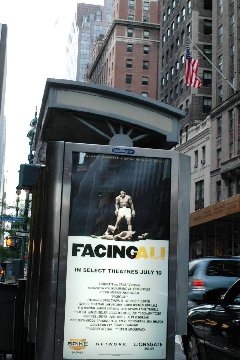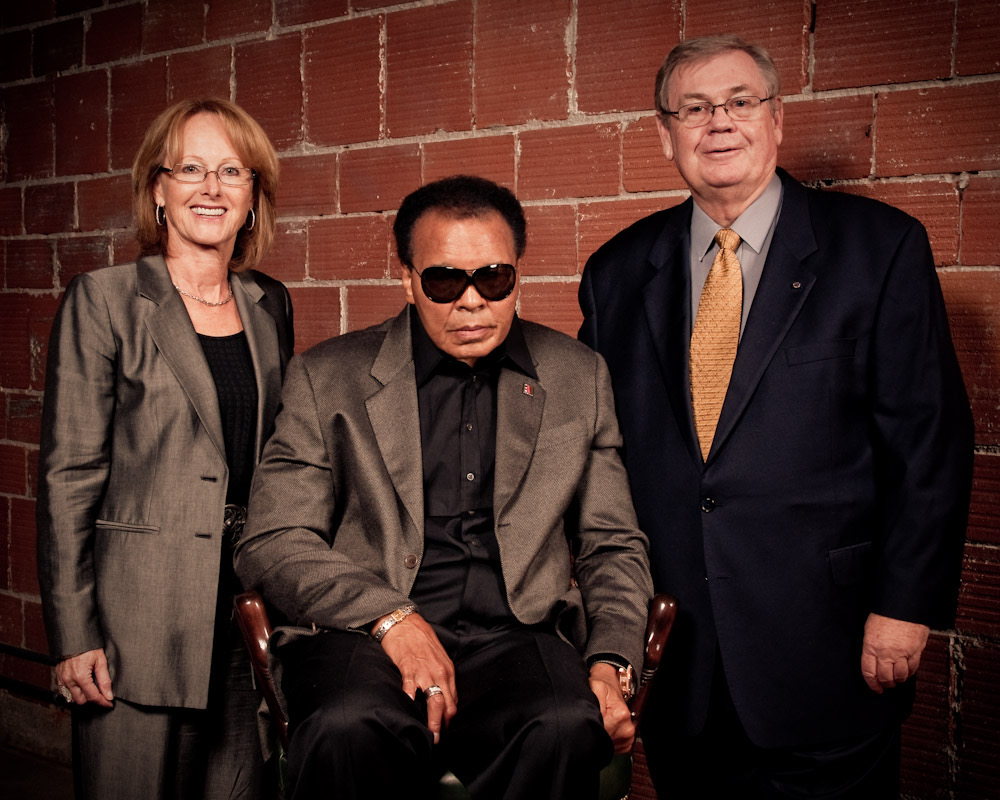Between Butterfly and Bees
Meeting Muhammad Ali was intimidating, and he wasn’t even wearing boxing gloves. He sat patiently at the photographer’s setting, acknowledging each guest with a faint smile. He may even have given an extra blink to the matching shimmering color of our pantsuits.
Facing Ali is a documentary featuring his former illustrious rivals as they celebrate the three-time World Heavyweight Champion and 1960 Rome Olympic Gold medalist. Based on a book by Canadian sportswriter Stephen Brunt, Facing Ali focuses on the human nature of the rink warriors. The testimonials are an explosive retrospective of the boxer’s career and a tribute to the man.
Muhammad Ali and his wife Lonnie arrived secretly in Vancouver, BC, on October 9th, 2009 for the private screening of Facing Ali/The Untold Stories of Warriors, at District 319 Theatre. Released by Lions Gate, directed by Pete McCormack (See Grace Fly, Uganda Rising), it was produced by Network Entertainment Derik Murray (Legends of Hockey, Making the Cut).
After Murray’s welcome, the room went dark, and Ali’s silhouette leaned toward the screen for the next 100 minutes. When the lights came back on, he remained seated, perhaps collecting his thoughts. He just watched a retrospective of his life through his former opponents’ emotionally charged and honest interviews. “The Greatest” then slowly stood up and moved cautiously to the exit under the audience applause and cheering. The documentary deepened their understanding of the charismatic athlete.
At the reception—an exclusive fundraiser for the Ali Center—Vancouver Mayor Gregor Robinson presented Ali with a framed Proclamation by the City of Vancouver, honoring the man and his mission with a Muhammad Ali Day.
His health condition, however, was a reminder of the necessity of a cure for Parkinson’s. But Ali’s assistant was clear, “He doesn’t want people to feel sorry for him, he is happy.” Ali didn’t talk, but his presence exuded all that he stood for.
The Warriors of the Ring
Other than in The Rumble in the Jungle in Zaire, The Thrilla in Manila in the Philippines, and vintage footage of the seventies, George Foreman, Joe Frazier, George Chuvalo, Sir Henry Cooper, Larry Holmes, Ken Norton, and Leon Spikes play themselves on the big screen, sharing intimate insights about “the man who could float like a butterfly, sting like a bee in the boxing ring.”
Muhammad Ali transformed the sport with a brilliant strategy, combining physical ability and psychological domination over his opponents. No one knows this more than Joe Frazier, who faced Ali in 47 rounds, sometimes at the risk of his life. With 56 victories for 61 fights and 37 wins by KO, the champion was truly “The Greatest.”
However, 1967 to 1971 were not his best nor easiest times. First, Sports Illustrated Tex Maule described Ali’s notorious win over Ernie Terrel as “a wonderful demonstration of boxing skill and a barbarous display of cruelty.” Then, in May 1967, Ali’s boxing license was suspended after he was prosecuted for his refusal to join the U.S. Armed Forces. During Ali’s three years of exile from the ring, Frazier regained the World Heavyweight Champion title yet extended financial opportunities to Ali. They met again in 1971 in the much-anticipated Fight of the Century with Frazier’s victory in the final round.
Ali’s Parkinson’s Diagnosis and Legacy
Ali retired in 1981 and was diagnosed with Parkinson’s disease in 1986. His life purpose had just begun. He shared such insights in Soul of a Butterfly (2004), a memoir he wrote with Hana, one of his seven daughters—Ali has two sons:
“During my boxing career, you did not see the real Muhammad Ali. You just saw a little boxing. You saw only a part of me. After I retired from boxing my true work began. I have embarked on a journey of love.“
Ali has received numerous awards, and his humanitarian work is a testimony of his once rebellious yet always social justice-minded spirit. He traveled the world to bring awareness and compassion to desperate causes. In 1990, he negotiated the release of 15 hostages in Iraq. In 2002, the United Nations named him Messenger of Peace, and he went to Afghanistan.
John Ramsey, Ali Center VP of Marketing and Government Affairs, stressed the genuine compassion of a man who discretely visited hospitals. He shared Ali’s favorite story about a little boy with cancer. Ali had made a deal with him. “I whip Foreman and you beat cancer.” Ali beat Foreman, but the little boy was losing his fight. “Mr. Ali, I am going to meet God, and I am going to tell him I know you,” he said.
The Muhammad Ali Center in Louisville, Kentucky became Ali’s dream of a place that inspires adults, and children in particular, to pursue their dreams, be accepting of others regardless of ethnicity or background, and instill the belief in “the greatness that lies in each of us.”
“His impact recognizes no continent, no language, no color, no ocean… Muhammad Ali belongs to us all,” Maya Angelou said.
First published 2010 Orato.com


